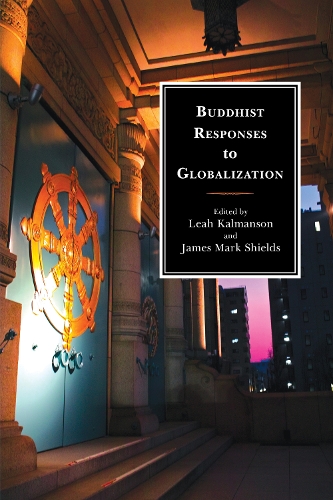
Buddhist Responses to Globalization
(Hardback)
Publishing Details
Buddhist Responses to Globalization
By (Author) Leah Kalmanson
Edited by James Mark Shields
Contributions by Peter D. Hershock
Contributions by Carolyn M. Jones Medine
Contributions by Ugo Dessi
Contributions by Melanie L. Harris
Contributions by John W. M. Krummel
Contributions by Erin McCarthy
Bloomsbury Publishing PLC
Lexington Books
22nd July 2014
United States
Classifications
Professional and Scholarly
Non Fiction
Buddhism
Philosophy of religion
Globalization
181.043
Physical Properties
Hardback
182
Width 162mm, Height 239mm, Spine 19mm
422g
Description
This interdisciplinary collection of essays highlights the relevance of Buddhist doctrine and practice to issues of globalization. From various philosophical, religious, historical, and political perspectives, the authors show that Buddhismarguably the worlds first transnational religionis a rich resource for navigating today's interconnected world. Buddhist Responses to Globalization addresses globalization as a contemporary phenomenon, marked by economic, cultural, and political deterritorialization, and also proposes concrete strategies for improving global conditions in light of these facts. Topics include Buddhist analyses of both capitalist and materialist economies; Buddhist religious syncretism in highly multicultural areas such as Honolulu; the changing face of Buddhism through the work of public intellectuals such as Alice Walker; and Buddhist responses to a range of issues including reparations and restorative justice, economic inequality, spirituality and political activism, cultural homogenization and nihilism, and feminist critique. In short, the book looks to bring Buddhist ideas and practices into direct and meaningful, yet critical, engagement with both the facts and theories of globalization.
Reviews
I feel the book is a coherent study that should be welcomed by those interested in socially engaged Buddhism and globalization. * Journal of Global Buddhism *
Buddhisms millennia-long eastward journey has, especially over the course of the last century,reached all the way around the globe to the West.The question is, how can Buddhism contribute to resolving the problems and developing the possibilities ofthe globalizingworld. It is this question that this volume boldly begins to answer, effectively addressing, from various Buddhist perspectives,critical contemporary issuessuchas economic inequality,racism, feminism and womanism, postcolonial reparations, and the very meaning of globalization and glocalization. -- Bret W. Davis, Professor of Philosophy, Loyola University Maryland
This volume offers groundbreaking treatment of the interaction between globalization and Buddhism. The authors explore a rich array of topics, including the glocalization of religious practices, fierce compassion, tension between expanding freedoms and deepened inequality, new forms of nonviolent engagement generated by Buddhist dialogue with Womanist thought, and other Buddhist resources for responding to the injustices of globalization. With both descriptive and constructive approaches, these interdisciplinary essays will pique the curiosity of a wide range of readers. -- Christopher Ives, Stonehill College
Historically, the various Buddhist traditions have proven adept at cultural transmigration, and this is abundantly evident today on a global scale. Nonetheless, the terms and conditions of the current regimes of globalization also pose profound challenges to Buddhist practice. In this timely, innovative, and groundbreaking collection of essays, voices within these traditions respond, articulating radical and philosophically provocative elements (cultural, womanist, post-colonial, economic, etc.) of a Buddhist critical engagement with globalization. This is a collection of genuine importance. -- Jason M. Wirth, Professor of Philosophy, Seattle University
The essays gathered in this volume will prove to be an essential resource for understanding the diverse ways in which Buddhists have sought to come to terms with the challenges of globalization and modernity. -- Eric Nelson, University of Massachusetts, Lowell
Author Bio
Leah Kalmanson is assistant professor of philosophy and religion at Drake University. James Mark Shields is associate professor of comparative humanities and Asian thought at Bucknell University and Japan Foundation visiting research fellow at the International Research Center for Japanese Studies.
